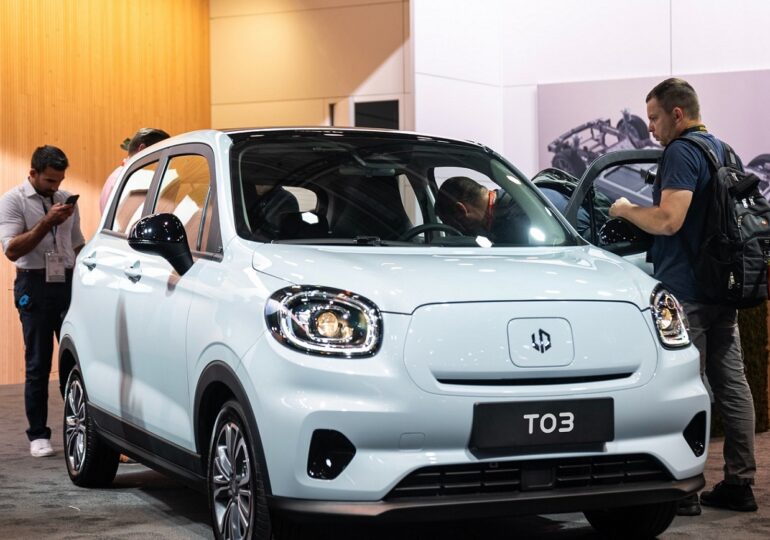The issues Volkswagen is facing are raising increasing doubts about the future of the European sector, as cheap electric vehicle imports rise. But instead of fighting together, some of the giants are wasting precious time and starting to collaborate with the Chinese.
For decades, Germany has enjoyed the reputation of being the automotive capital of Europe, with slogans like „Vorsprung durch Technik” („Advancement through Technology”) emblematic of its political and industrial skill. But the problems looming over Volkswagen, where unions are facing threats of layoffs and factory closures, have raised questions not only about the future of the German automotive industry but also the entire European auto sector, as outlined in an analysis by The Guardian.
The unease gripping the market has been fueled by an invasion of cheaper Chinese electric vehicles and the slow death of the internal combustion engine.
The EU, US, and Canada have announced plans to limit sales of Chinese-made electric vehicles through tariffs, but some European car manufacturers warn that these will have a cannibalizing effect, hastening the closure of factories in countries like Germany.
The sense of imminent danger for the European industry was visible at the Paris Motor Show, where Chinese manufacturers emphasized their determination to tap into the European market, the largest open market for them after the US imposed 100% tariffs on electric vehicle imports from Beijing.
Under the spotlight at the Porte de Versailles exhibition center, nine Chinese companies showcased new cars and strategic plans to gain a larger market share in Europe.
European Giants Fail to Unite Even at the Eleventh Hour
Tariffs have been met with mixed reactions from the leadership of auto manufacturers on the continent.
Carlos Tavares, the head of Stellantis, the group that owns the brands Citroën, Fiat, Vauxhall, and Jeep, stated that the cumulative effect of EU tariffs will further erode the European industry. He emphasized that to avoid tariffs, Chinese car manufacturers like BYD are ramping up plans to assemble their vehicles in Europe.
Tavares warned that Chinese manufacturers will not go to Germany, France, or Italy, the countries of the oldest auto producers in Europe, but will seek cheaper options in Eastern European countries like Hungary, where labor costs are lower.
This would mean "accelerating the need to close factories" elsewhere in Europe, thus bypassing the purpose of the protective tariffs set to come into effect in November, he mentioned.
The opinion of the Stellantis chief highlights the growing discord in the heart of the EU regarding automotive policy. France and its president, Emmanuel Macron, who opened the show in Paris, have firmly supported tariffs. In contrast, Germany was among the countries that voted against tariffs two weeks ago.
In past years, the bloc's largest economy was able to convince others, including France, and create a unified position, but EU leadership has not been a strong point for German Chancellor Olaf Scholz, notes the British daily.
In this power vacuum, the European auto industry has shifted to battle mode. Pressured by their own economic problems and declining demand for electric vehicles exacerbated by China's increasing presence in their backyards, German auto industry leaders have gone even further than Stellantis.
Chinese Move to the Next Phase of Attack, and Some Collaborate with Them
Instead of taking advantage of all the protections that the EU offers through tariffs, the European industry seems to be self-devouring, asking for more time to adapt to the new electric world.
Oliver Zipse, CEO of BMW, which has lagged behind in the electric vehicle race, called for a "softening" of the EU's 2035 deadline for banning the production of new combustion engine cars.
A spokesperson for the European Commission stated Thursday that the institution is in constant dialogue with the industry but noted that the 11-year target has given the industry enough time to prepare for the ban on petrol and diesel engines.
In a statement that further alarmed the European auto sector, BYD, one of China's largest conglomerates, announced plans to locally produce all cars it sells in Europe and to assemble battery packs, the most expensive component of any electric vehicle, in Hungary and Turkey.
Geely, the owner of Volvo, Polestar, and Lotus, is seeking production sites in Europe, including Poland, while new Chinese players like Dongfeng, Seres, and FAW present new models and seek electric vehicle sales abroad to offset weaker results in the competitive domestic market and price wars there.
The European Commission has indicated that investments in Europe can be a way to avoid tariffs. But auto industry leaders fear this will allow competition to invade their turf.
Meanwhile, some European manufacturers are waving the white flag and seeking to collaborate with the Chinese invaders threatening their future.
Leapmotor, a partner of Stellantis, is ready to take orders for a city car assembled in Poland.
And according to announcements on Thursday in Paris, Geely and Spotlight Automotive, a partnership between BMW and the Chinese company Great Wall Motor, are also trying to finalize investment agreements in the EU.
T.D.

